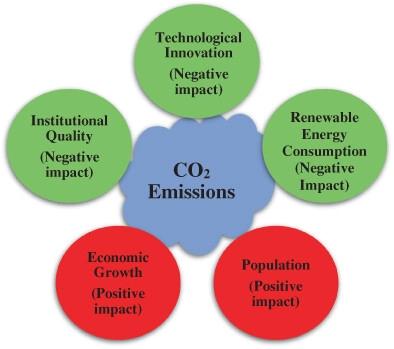当前位置:
X-MOL 学术
›
Journal of Public Affairs
›
论文详情
Our official English website, www.x-mol.net, welcomes your
feedback! (Note: you will need to create a separate account there.)
Modeling the macroeconomic determinants of environmental degradation in E-7 countries: The role of technological innovation and institutional quality
Journal of Public Affairs ( IF 2.7 ) Pub Date : 2022-07-18 , DOI: 10.1002/pa.2834 Ahsan Anwar 1 , Amatul R. Chaudhary 1 , Summaira Malik 2
Journal of Public Affairs ( IF 2.7 ) Pub Date : 2022-07-18 , DOI: 10.1002/pa.2834 Ahsan Anwar 1 , Amatul R. Chaudhary 1 , Summaira Malik 2
Affiliation

|
Environmental degradation poses a severe threat to life on earth. Similarly to other countries, emerging seven (E-7) countries have been struggling to decrease their dependence on non-renewable energy sources by adopting environment friendly technologies for reducing environmental deterioration and to achieve sustainable development goals (SDGs) of the United Nations. In present study, we reassessed the technological policies of E-7 countries, and addressed the issues of affordable and clean energy, institutional quality (IQU), and sustained economic growth (EGR) to address the problem of environmental deterioration. For this purpose, we have investigated the role of renewable energy consumption (REC), technological innovations (TINs), IQU, and EGR on CO2 emissions (CE) by using the panel quantile regression (PQR) for the period from 1996 to 2020. The empirical outcomes of FGLS reveal that a 1% increase in REC, TIN, and IQU reduces the CE by 0.145%, 0.233%, and 0.249%, while a 1% rise in EGR and population (POPU) raises the CE by 0.993% and 1.546% respectively. Similarly, the results of PQR demonstrate that REC, TIN, and IQU reduce CE, whereas EGR and POPU increase environmental degradation. The impact of TIN on CE is high at lower quantiles and low at higher quantiles. The impact of IQU on CE is low at lower quantiles and high at higher quantiles Based on these findings, we have recommended a comprehensive SDG-oriented policy framework, so that E-7 countries can make progress towards achieving the objectives of SDG 16, SDG 13, SDG 7, SDG 8, and SDG 9.
中文翻译:

对 E-7 国家环境退化的宏观经济决定因素进行建模:技术创新和制度质量的作用
环境退化对地球上的生命构成严重威胁。与其他国家类似,新兴七国 (E-7) 一直在努力通过采用环境友好技术来减少环境恶化并实现联合国的可持续发展目标 (SDG),从而减少对不可再生能源的依赖。在本研究中,我们重新评估了 E-7 国家的技术政策,并解决了负担得起的清洁能源、制度质量 (IQU) 和持续经济增长 (EGR) 等问题,以应对环境恶化的问题。为此,我们研究了可再生能源消耗 (REC)、技术创新 (TIN)、IQU 和 EGR 对 CO 2的作用通过使用 1996 年至 2020 年期间的面板分位数回归 (PQR) 计算排放量 (CE)。FGLS 的实证结果表明,REC、TIN 和 IQU 每增加 1%,CE 就会降低 0.145%、0.233% 和0.249%,而 EGR 和人口 (POPU) 每增加 1%,CE 分别提高 0.993% 和 1.546%。同样,PQR 的结果表明 REC、TIN 和 IQU 减少 CE,而 EGR 和 POPU 增加环境退化。TIN 对 CE 的影响在较低分位数时较高,而在较高分位数时较低。IQU 对 CE 的影响在较低分位数时较低,而在较高分位数时较高 根据这些发现,我们推荐了一个全面的面向 SDG 的政策框架,以便 E-7 国家能够在实现 SDG 16、SDG 的目标方面取得进展13、SDG 7、SDG 8 和 SDG 9。
更新日期:2022-07-18
中文翻译:

对 E-7 国家环境退化的宏观经济决定因素进行建模:技术创新和制度质量的作用
环境退化对地球上的生命构成严重威胁。与其他国家类似,新兴七国 (E-7) 一直在努力通过采用环境友好技术来减少环境恶化并实现联合国的可持续发展目标 (SDG),从而减少对不可再生能源的依赖。在本研究中,我们重新评估了 E-7 国家的技术政策,并解决了负担得起的清洁能源、制度质量 (IQU) 和持续经济增长 (EGR) 等问题,以应对环境恶化的问题。为此,我们研究了可再生能源消耗 (REC)、技术创新 (TIN)、IQU 和 EGR 对 CO 2的作用通过使用 1996 年至 2020 年期间的面板分位数回归 (PQR) 计算排放量 (CE)。FGLS 的实证结果表明,REC、TIN 和 IQU 每增加 1%,CE 就会降低 0.145%、0.233% 和0.249%,而 EGR 和人口 (POPU) 每增加 1%,CE 分别提高 0.993% 和 1.546%。同样,PQR 的结果表明 REC、TIN 和 IQU 减少 CE,而 EGR 和 POPU 增加环境退化。TIN 对 CE 的影响在较低分位数时较高,而在较高分位数时较低。IQU 对 CE 的影响在较低分位数时较低,而在较高分位数时较高 根据这些发现,我们推荐了一个全面的面向 SDG 的政策框架,以便 E-7 国家能够在实现 SDG 16、SDG 的目标方面取得进展13、SDG 7、SDG 8 和 SDG 9。











































 京公网安备 11010802027423号
京公网安备 11010802027423号